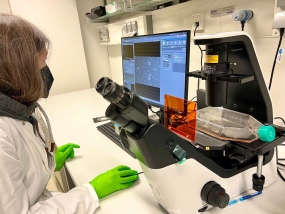13/01/2023
Print PageCancer in children: New treatment opportunities through drug testing on mini-tumors
The Hopp Children’s Cancer Center Heidelberg (KiTZ) is a joint institution of the German Cancer Research Center (DKFZ), Heidelberg University Hospital (UKHD) and the University of Heidelberg (Uni HD).

Resistance to cancer drugs is one of the most pressing problems in pediatric oncology. One fifth of all children with cancer suffer a relapse after initially successful treatment and the standard therapies no longer work.
"Physicians then usually have little time to fight the cancer again. On average, this is only a few months," explains Olaf Witt, director at the Hopp Children's Cancer Center Heidelberg (KiTZ), head of the Clinical Cooperation Unit Pediatric Oncology at the German Cancer Research Center (DKFZ) and senior physician at Heidelberg University Hospital (UKHD). The INFORM program led at KiTZ aims to provide children with cancer worldwide with new treatment options as quickly as possible when the cancer returns or there are no established therapies. Since 2015, more than 2,500 young patients from 100 centers in 13 countries have been enrolled in the registry study.
The physicians in Heidelberg decode the tumor's genome to look for molecular weak points that can be attacked with drugs. A small sample of the tumor is also kept alive so that the effectiveness of as many drugs as possible can be tested in the laboratory. One study shows that these mini-tumors can be reliably used in the laboratory in a high-throughput procedure to test the efficacy of drugs.
From the cancer tissue samples of 132 patients treated at different cancer centers in Europe, the team of physicians and scientists led by Olaf Witt cultivated mini-tumors and subjected them to the drug test specially developed for INFORM. Up to 78 drugs that have already been approved or are currently undergoing clinical trials could be tested in parallel on the respective samples. The results of the tests confirmed on the one hand the molecular targets identified by genome analysis: In tumor samples with known cancer-driving genetic alterations such as BRAF, ALK, MET and NTRK, therapeutics directed against these targets also killed the mini-tumors most effectively.
In addition, the team found effective drugs for 80 percent of the samples in which no therapeutically relevant molecular weakness was found in the tumor genome. "This means that drug testing, in addition to tumor genome decoding, is another way to identify alternative treatment options for patients," Olaf Witt emphasizes.
Testing drugs on mini-tumors, rather than on simple cell cultures, or mice transferred to patients' tumors, as was previously the case, is a major advance, explains Ina Oehme, of INFORM: To grow tumors in mini-organs with multiple layers of tissue, or in mice, normally requires several months. "With the new method, we were able to shorten the time from sample receipt to results for patients to three weeks," says Oehme. The method could also be applied to a variety of cancers, including bone and soft tissue tumors, as well as brain tumors and other tumor types, and works well with smaller tissue samples, in some cases even fine-needle biopsies.
An important future goal of INFORM will be to compare the results from the lab with the clinical course of patients to study the reliability of the predictions. "Our initial clinical observations in children indicate that the tests in the laboratory can predict resistance development in the young patients," says Olaf Witt. "We hope that the clinical studies now planned will confirm the reliability of the procedure. If that is the case, we could use the laboratory tests to open up a new treatment opportunity for many more children."
Here you can find the original report.
Click here to see the original publication.